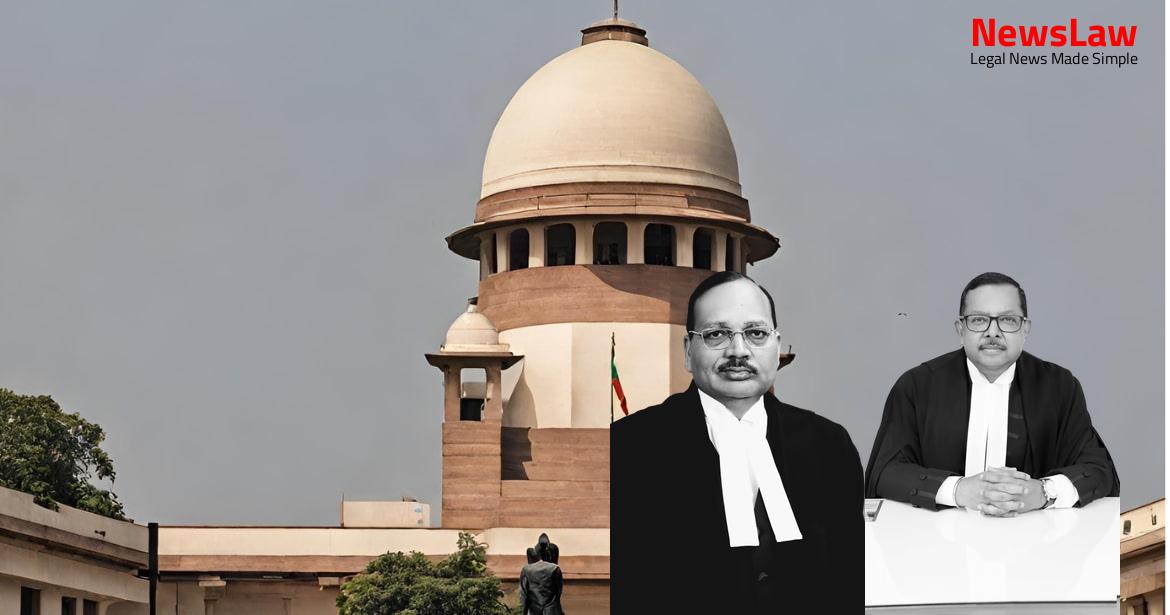In a significant legal victory, the Supreme Court of India has ruled in favor of the appellant in the case against the Bihar Government. The judgement overturns the decision regarding the reduction in pay scale and recovery order initiated by the government. This ruling holds immense importance in ensuring justice and upholding natural justice principles in administrative actions. Stay tuned to learn more about this crucial development in the legal landscape.
Facts
- The appellant superannuated from the post of ADSO on 31 January, 2001.
- At the time of retirement, the last pay drawn by the appellant was Rs.10500 in the pay scale of Rs.6500-10500 with admissible emoluments.
- The Government of Bihar issued a Resolution dated 8 February, 1999 revising the pay scale of Marketing Officer and ADSO w.e.f. 1 January, 1996.
- After serving for 15 years, the appellant received his first time-bound promotion as Marketing Officer and was put in Junior Selection Grade w.e.f. 1 April, 1981.
- Upon completing 25 years in service, the appellant was further promoted to the post of Senior Selection Grade, Marketing Officer-cum-Assistant District Supply Officer (ADSO) w.e.f. 10 March, 1991 in the pay scale of Rs.2000-3800.
- The Accountant General of Bihar raised an objection regarding the appellant’s promotion on 10 March, 1991, and stated it would become ineffective after 1 January, 1996 as per the Government Resolution of 8 February, 1999.
- The appellant filed representations to protest against the reduction of his pension and proposed recovery due to misinterpretation of the Government Resolution.
- A sum of Rs.63,765 was found to be paid in excess to the appellant beyond his entitlement, leading to a recovery notice from the Government of Bihar.
- Various legal measures were taken by the appellant, including filing a Writ Petition No. 6714 of 2009 before the High Court and a Review Petition No. 82 of 2010, which was rejected.
- The appellant sought protection of his pay scale fixed at Rs.6500-10500 on the promotional post of ADSO.
- The appellant’s representation for promotion was rejected by the Food and Consumer Protection Department of the Government of Bihar in 2009.
- The promotion granted to the appellant was to end by December 31, 1995, as per a Government Resolution.
- The appellant’s pay scale was to be revised and reduced based on the Resolution to treat him as a Marketing Officer instead of ADSO at the time of retirement.
- The appellant challenged this decision in the High Court of Patna through CWJC No 18542 of 2009.
Also Read: Acquittal of Accused Appellants in Mohmedfaruk @ Palak Safibhai Memon Case
Arguments
- The appellant argues that the impugned orders are legally flawed due to misinterpretation of the Government Resolution dated February 8, 1999.
- The appellant asserts that the Government Resolution clearly states that employees who received time-bound promotions before December 31, 1995, would not face adverse effects.
- The appellant had received a time-bound promotion in 1991, well before the cutoff date, thus should be protected from adverse effects as per the Resolution.
- The reduction in the appellant’s pay scale and the recovery direction after retirement without natural justice principles are deemed illegal and violative of the Constitution.
- The appellant maintains that the Single Judge and Division Bench of the High Court erred in interpreting the Government Resolution, as paragraph 11 protects the appellant’s promotion and pay scale up to December 31, 1995.
- The appellant was rightfully entitled to the revised pay scale recommended by the 5th Pay Commission due to his promotion before the cutoff date.
- The appellant has not been singled out for the impugned action, no discrimination is meted out to the appellant.
- The Office of the Accountant General noticed an error in the pay scale granted to the appellant.
- A letter was issued asking for the excess amount received by the appellant to be refunded.
- The High Court interpreted the Government Resolution and denied relief to the appellant.
- Majority of the beneficiaries have retired or are close to retirement.
- Considering the circumstances, no recovery of excess amount should be made from the appellant teachers.
- The Government Resolution dated 8 February 1999 was uniformly applicable to all employees in Bihar.
Also Read: Judgment by the Supreme Court Of India: Board of Directors vs Charged Officer
Analysis
- The appellant had been accorded time-bound promotions as per entitlement on 10 March 1991.
- Reduction in pay scale and recovery of excess payment cannot be applied retrospectively after a long time gap.
- Reduction in pay scale and recovery from a government employee would be considered punitive action with drastic consequences.
- No action could have been taken against the appellant as he had superannuated eight years prior, and the recovery notice was issued much later without a show cause notice.
- The order for reduction in pay scale and recovery was passed in violation of principles of natural justice.
- The appellant, having been rightfully promoted to Upper Senior Grade (Upper Marketing Officer) in 1991, was entitled to the pay scale of the promotional post.
- The Departmental inquiry mentioned in the recovery notice was conducted without any prior inquiry against the appellant.
- The confusion was due to inaction, negligence, and carelessness of Bihar Government officials.
- Relief against recovery granted by courts if excess payment not due to employee fraud or misrepresentation.
- Employees not liable for recovery if they had no knowledge of receiving excess payment.
- Equity and judicial discretion used to relieve employees from hardships of recovery.
- Recovery not applicable to retired employees or those due to retire within a year.
- Examples from service jurisprudence where courts gave limited relief for past excess payments.
- Employers can recover excess unauthorized payments if detected within a short time.
- Long duration of incorrect payment makes recovery iniquitous.
- The action directing reduction of pay scale and recovery of excess amount is deemed grossly arbitrary, illegal, and lacking adherence to natural justice.
- The order dated 8 October 2009, by the State Government, reducing the pay scale of the appellant from Rs.6500-10500 to Rs.5500-9000 effective from 1 January 1996 is quashed and set aside.
- The direction for recovery of excess amount from the appellant is considered grossly illegal and arbitrary and is thus overturned.
- The order dated 27 August 2012 passed by the Division Bench of the High Court is found to be flawed and is quashed as well.
- The appellant is entitled to continue receiving the pension in accordance with the pay scale of Rs.6500-10500.
- Any reduction in pension and subsequent recovery due to the impugned orders should be restored/reimbursed to the appellant with applicable interest.
- The appeal is allowed and no costs are ordered.
- Pending applications, if any, are disposed of.
Also Read: Acquittal of Accused in Fabricated Kidnapping Case
Case Title: JAGDISH PRASAD SINGH Vs. STATE OF BIHAR (2024 INSC 591)
Case Number: C.A. No.-001635-001635 – 2013



